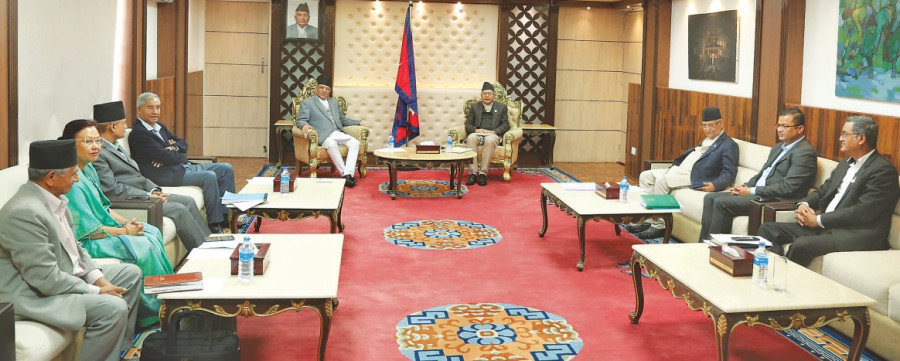Politics
As differences persist on key bills, top leaders of major parties fail to meet
Deferred citing Oli’s illness, the meeting may be held today, according to the prime minister’s personal secretary.
Tika R Pradhan
A meeting of the three top leaders called by Speaker Devraj Ghimire to discuss issues related to essential bills and parliamentary proceedings failed to take place on Friday.
Though party leaders have claimed that the meeting was postponed after the main opposition leader KP Sharma Oli reported ill health for his inability to attend it, the other leaders said they had failed to meet owing to their differences.
Prime Minister Pushpa Kamal Dahal, Nepali Congress President Sher Bahadur Deuba and CPN-UML chair Oli had held discussions on April 8 at the Speaker's office in Singha Durbar and on April 11 at the Speaker’s residence at Baluwatar.
“The Speaker informed us that he had to cancel today’s meeting because former prime minister Oli had a fever,” said Ramesh Malla, personal secretary to the prime minister. “The next meeting could be held tomorrow because there are some crucial issues to sort out.”
According to Malla, the bill related to the Constitutional Council needs to be finalised at the earliest, to ensure that the judiciary is not left headless.
“I don’t think there is anything for the UML to object to in the bill related to the Constitutional Council Act,” Malla said.
CPN-UML chief whip Padam Giri also said there isn't much of a problem with the constitutional council-related bill as the amendment proposal has incorporated issues put forth by the previous KP Sharma Oli-led government.
However, the problem was with the bill related to transitional justice.
“We are also concerned and agree on endorsing the TRC-related bill at the earliest, but for that, all the thematic committees must be formed, as soon as possible,” Giri told the Post.
“We want the bill to be endorsed after discussing it at the thematic committee which needs to be formed at the earliest,” he added, clarifying that there should be no room for complaints from the victims about the process.
In the April 11 meeting, the three leaders had agreed to select the leadership of the joint committee and other parliamentary committees through consensus among the major parties.
According to members of the Speaker’s Secretariat, the meeting was called to discuss the business of the House of Representatives, the formation of the joint committees and other thematic committees, besides the constitution of a joint regulation drafting committee.
The UML has continued to put pressure on the ruling coalition against its proposal to endorse the bill related to the Truth and Reconciliation Commission Act through a fast-track process.
The prime minister, on his part, had proposed forming a special committee, but the leaders attending the meeting said there had been no discussions.
“We didn’t even discuss the formation of the special committee at the April 11 meeting,” said one of the participants. “The meeting was only focused on the TRC bill and the formation of parliamentary committees.”
According to a leader close to the UML, Oli had advised the prime minister to withdraw the government’s decision to celebrate People’s War day; only then would the party discuss the bill. The prime minister is learnt to have responded that the decision was taken by the Cabinet involving UML ministers.
In its Common Minimum Programme, the government has promised to complete the pending peace process within two years.
The ruling parties have been cajoling the opposition to pass the bills related to transitional justice via a fast-track process without sending it to the thematic committee, but the parties outside the government are demanding that the bill must be sent to the related committee for a thorough discussion.
The federal parliament is yet to form its thematic committees. There will be a total of 16 committees, including 10 in the House of Representatives, four in the National Assembly and two joint panels that include the parliamentary hearing committee.
On April 11, after discussing the issues in the presence of some experts, the three leaders agreed to make the bills related to the peace process acceptable to all.
The meeting was attended by chief whips–Padam Giri of UML, Hitraj Pande of CPN (Maoist Centre), Congress lawmaker Ishwori Neupane and Attorney General Dinmani Pokhrel, besides former attorney general Ramesh Badal.
There were concerns from the victims that the bill to amend the Enforced Disappearance Enquiry and TRC Act registered in Parliament was designed to protect the perpetrators.
On behalf of Prime Minister Dahal, who also oversees the law ministry, the government spokesperson and Minister for Communications and Information Technology Rekha Sharma proposed the bill for the House’s consideration on March 27.
The April 11 meeting also discussed the formation of parliamentary committees after UML chair Oli had pressed the prime minister to form the committees without delay.
However, according to leaders privy to the meeting, the prime minister had said he needed to discuss the issue with his coalition partners first.
“The UML has demanded at least four of the 12 members sent to the parliamentary hearing joint committee from the House and one of the three representing the National Assembly,” said a UML leader, who wished not to be named.
In the 15-strong hearing committee, 12 members are picked from the House of Representatives, and the three others from the Assembly.
The leader said the UML opposes the ruling coalition’s plan to include a lawmaker from the CPN (Unified Socialist) in his party’s quota.




 13.12°C Kathmandu
13.12°C Kathmandu














